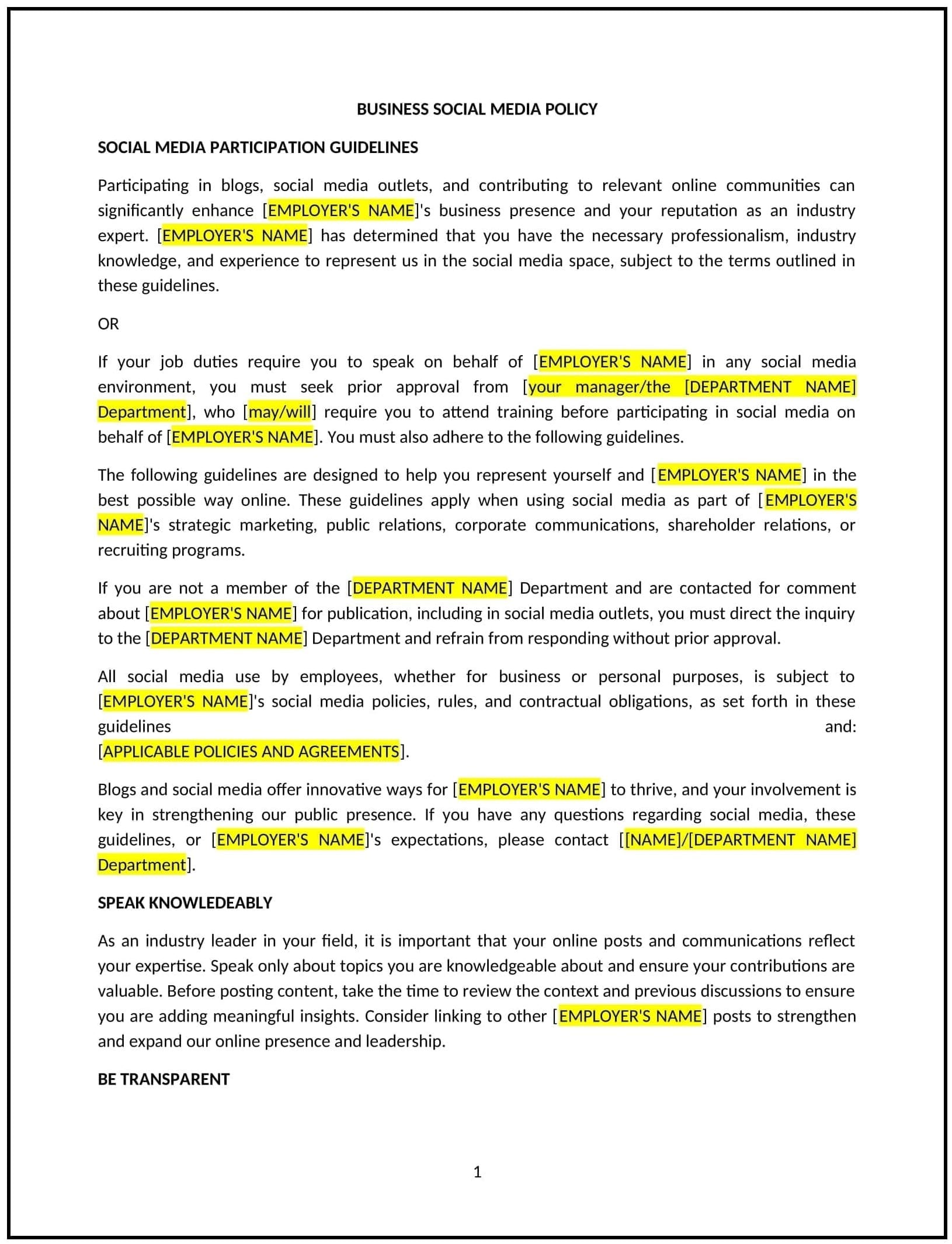Business social media policy (New Mexico): Free template
Got contracts to review? While you're here for policies, let Cobrief make contract review effortless—start your free review now.

Customize this template for free
Business social media policy (New Mexico)
This business social media policy is designed to help New Mexico businesses establish guidelines for employees' use of social media in a way that protects the company's reputation, promotes professional conduct, and aligns with legal and ethical standards. It outlines expectations for both personal and professional use of social media, including how employees should represent themselves and the company online.
By adopting this policy, New Mexico businesses can manage the risks associated with social media use, promote a positive image, and ensure that employees understand the impact of their online behavior on both their personal and professional lives.
How to use this business social media policy (New Mexico)
- Define acceptable and unacceptable use: Clearly outline the types of social media activity that are acceptable and unacceptable, both during and outside of work hours, particularly in relation to content that represents the company or could affect its reputation.
- Set guidelines for professional social media use: Specify how employees should behave when using social media for work purposes, including creating or managing company accounts, representing the company’s interests, or interacting with customers online.
- Address personal social media activity: Establish expectations for personal social media activity, ensuring employees understand that their personal online conduct can have an impact on the company, especially when discussing topics related to their work.
- Emphasize confidentiality and data security: Ensure employees understand that they should never share confidential or proprietary information on social media and should adhere to company guidelines on privacy and data protection.
- Address the use of company resources: Set clear rules for employees using company devices, networks, or time for personal social media activity, and specify any limitations on the use of these resources for social media purposes.
- Reflect New Mexico-specific considerations: Incorporate any state-specific regulations or laws regarding social media use, employee rights to discuss workplace conditions, and protections against retaliation.
Benefits of using this business social media policy (New Mexico)
Implementing this policy provides New Mexico businesses with several advantages:
- Protects company reputation: By setting clear expectations for online behavior, businesses can reduce the risk of reputational damage caused by inappropriate posts or comments made by employees.
- Promotes responsible social media use: Encourages employees to be mindful of the impact of their social media activity on the business, leading to more thoughtful and professional online behavior.
- Reduces legal risks: Helps businesses minimize the risk of legal issues related to social media activity, including defamation, harassment, and violations of confidentiality or privacy laws.
- Enhances employee understanding: Provides employees with a clear framework for navigating social media usage in a professional context, which can lead to fewer misunderstandings and conflicts.
- Supports a positive company culture: Encourages employees to use social media in a way that aligns with company values, promoting a positive and consistent public image.
Tips for using this business social media policy (New Mexico)
- Communicate the policy clearly: Ensure all employees are aware of the policy from the start of their employment and periodically remind them of expectations related to social media use.
- Provide training: Offer training to employees on how to use social media responsibly and effectively, particularly if they manage official company accounts or interact with customers online.
- Monitor usage responsibly: Regularly monitor social media channels for potential issues while respecting employees' privacy. Take appropriate action when necessary to address behavior that violates the policy.
- Foster open communication: Encourage employees to reach out with questions or concerns about their social media activity and its impact on their professional responsibilities.
- Update the policy regularly: Review and update the policy periodically to reflect changes in New Mexico laws, industry standards, or emerging social media trends.